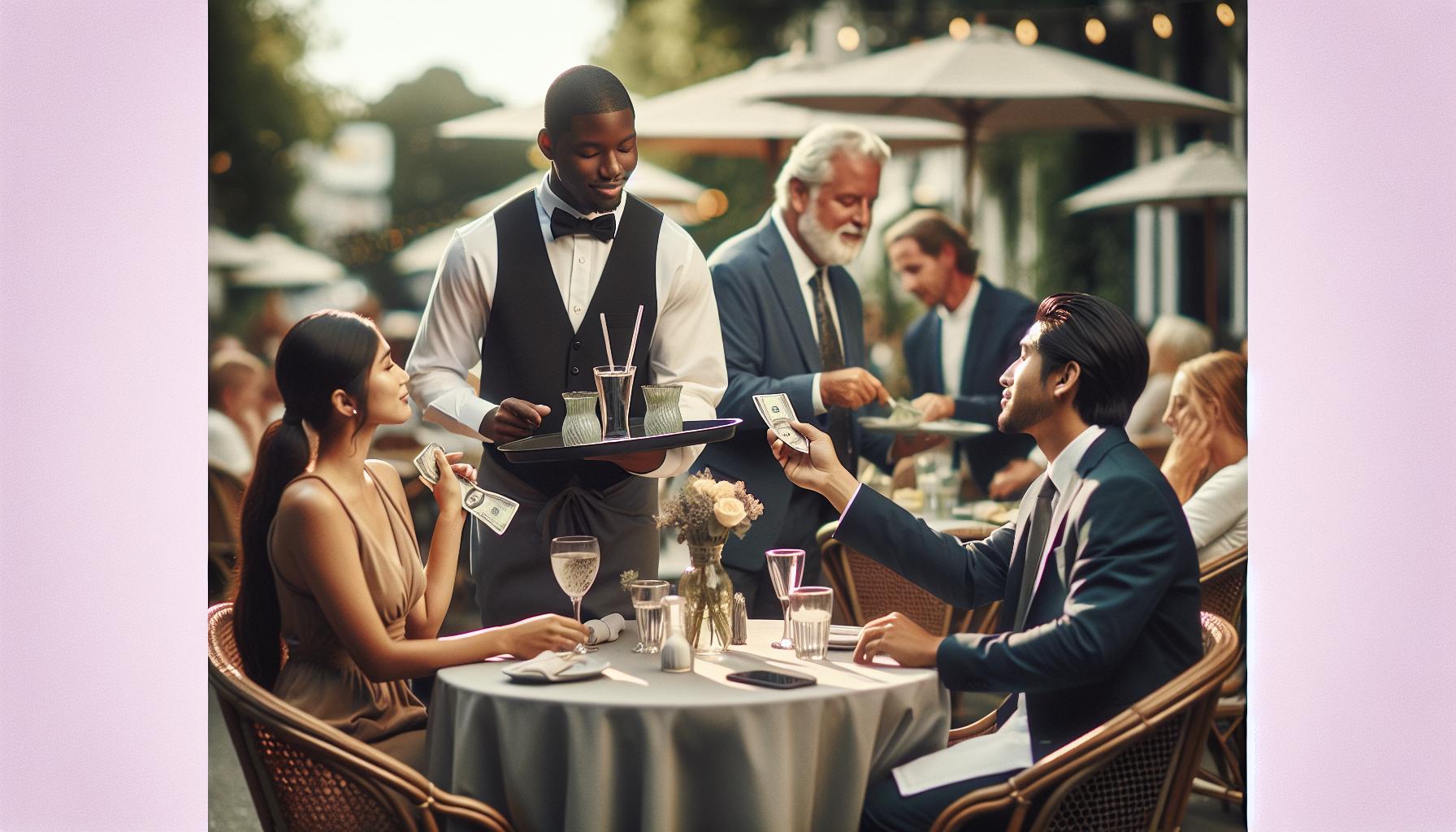Navigating the world of wedding vendors can be both exciting and overwhelming, especially when it comes to tipping. Did you know that proper tipping etiquette can express your gratitude and enhance the goodwill between you and your vendors? Understanding how much to tip each vendor not only reflects your appreciation for their hard work but also sets a positive tone for your big day. As you embark on this beautiful journey, consider how these gestures of gratitude can deepen your relationships with those who help bring your dream wedding to life. Let’s explore the nuances of tipping wedding vendors and ensure you celebrate your special day with grace and style.
– Understanding the Importance of Tipping Wedding Vendors
When planning a wedding, it’s easy to get lost in the myriad of details that come together to create your special day-venue selection, dress fittings, floral arrangements, and more. Amidst this whirlwind, the significance of tipping wedding vendors stands as a crucial aspect that often gets overlooked. Gratuity is not just a customary practice; it is a heartfelt gesture that acknowledges the hard work, talent, and dedication that vendors bring to your celebration. By tipping vendors, you are reinforcing the value of their services and the commitment they have made to ensure your wedding day runs smoothly.
Understanding the role of vendors-ranging from your florist to the catering staff-highlights the importance of their contributions. Each professional you hire plays an integral part in transforming your vision into reality, often going above and beyond to meet your needs and make your day as magical as possible. Tipping is a tangible way to express your gratitude and acknowledge their effort, particularly when they exceed expectations. Remember that many wedding vendors rely on tips as part of their overall compensation; your gesture can significantly impact their livelihood, especially in an industry heavily influenced by seasonal variations and varying client bases.
By engaging in the practice of tipping, you not only strengthen your relationship with these professionals but also contribute to a culture of appreciation within the wedding industry. Couples who tip well often find that their vendors become more invested in delivering exceptional service, going that extra mile to ensure every detail is perfect. This mutual respect enriches the overall planning experience and helps create a warm, positive environment that enhances the joy of your wedding day. So, as you embark on this beautiful journey, consider the ripple effect of your choice to give gratuity, fostering goodwill and connection with those who help bring your wedding to life.
– General Guidelines for Wedding Vendor Gratuity

When planning your wedding, the question of how to handle gratuities for your vendors might leave you feeling puzzled. Understanding the intricacies of tipping can ensure that your expressions of gratitude not only meet expectations but also enhance the relationships you’ve built throughout the planning process. Gratuity serves as a vital reflection of your appreciation for the professionalism and hard work that vendors bring to your special day.
As a general guideline, aim to tip between 15% to 20% of the total cost for services rendered, but remember that this can vary according to individual circumstances and the quality of service. The key is to gauge the experience you received-if a vendor went above and beyond, don’t hesitate to reward their efforts with a higher tip. Consider breaking down the gratuity amount based on the vendor’s role in your wedding. For example, you might allocate about 10% for the officiant, more for caterers and bartenders (15-20%), and recognize your wedding planner with an appropriate amount reflecting their effort in orchestrating your entire day.
Additionally, it’s important to clarify expectations with your vendors upfront, particularly regarding their policies on tipping. Some venues may include a service charge in the contract, which might cover tipping for certain staff members. Be sure to ask about this to avoid double tipping. If your vendors do not have specific preferences, consider giving gratuity in cash, since it provides a personal touch. You might even write a heartfelt note of thanks-this not only conveys genuine appreciation but also allows you to express sentiments that cash alone cannot convey.
In summary, while tipping can feel overwhelming amidst the myriad details of wedding planning, approaching it with a sense of generosity and mindfulness will enable you to navigate these gestures of gratitude with grace. In building positive relationships through thoughtful gratuity, you help foster an atmosphere of goodwill that can enrich your wedding experience, encouraging your vendors to pour their hearts into making your day unforgettable.
– How Much to Tip Each Type of Wedding Vendor

Your wedding day is a celebration of love and unity, and every vendor you choose plays a vital role in making this dream a reality. Recognizing their hard work with a thoughtful gratuity not only shows appreciation but also acknowledges the effort they put into your special day. Here’s a closer look at how much to tip each type of wedding vendor, enabling you to honor their contributions appropriately.
Common Vendor Tipping Guidelines
When considering gratuities, a good baseline is to allocate tips as follows:
- Wedding Planner: 15-20% of their fee is customary, especially if they went above and beyond to ensure your day runs smoothly.
- Caterers: Generally, 15-20% of the total bill. This amount is for the service staff who attend to guests.
- Officiant: Tips for officiants can range from $100 to $300, depending on their involvement and travel distance.
- Photographer and Videographer: While not always expected, a tip of $100-$200 each shows appreciation for capturing your memories.
- Florist: While a tip is not common for florists, if they deliver and set up on-site, consider $50-$100.
- Hair and Makeup Artists: 15-20% of the total service cost is a lovely way to show gratitude for helping you look your best.
- DJ or Band: A tip of $100-$200 for DJs or 15-20% of the overall bill for a band can reflect your appreciation for keeping the party lively.
- Transportation Services: For drivers, tipping between $20-$50 is typical, depending on the distance and quality of service.
Additional Considerations
Keep in mind that if a venue charges a service fee, this often covers gratuities for certain staff members, which can influence how much to tip. Always clarify this during planning to avoid any overlap. Cash tips, often presented in clearly marked envelopes, create a personal touch, making your gratitude felt even more deeply.
Ultimately, the essence of tipping lies in showing appreciation for hard work and exceptional service. By acknowledging each vendor’s unique contributions with thoughtful gratuities, you not only help them feel valued but also foster a positive atmosphere as your wedding day approaches. Each tip is a reflection of the trust you placed in these professionals, allowing them to share in the joy of your celebration.
– Tipping Etiquette for On-Site and Off-Site Vendors

Every wedding is a unique expression of love and joy, and it’s the dedicated vendors who help bring that vision to life. When it comes to showing appreciation, understanding the nuances of tipping etiquette for both on-site and off-site vendors is key to fostering goodwill and ensuring that your appreciation is felt. While tipping can feel daunting, especially on such a significant day, it’s an important way to acknowledge the hard work and talent of those who contribute to your celebration.
On-site vendors, such as catering staff, photographers, and organizers present during the event, often rely on your tips to supplement their income. For these individuals, it’s customary to offer cash gratuities at the end of the event. Cash tips tend to be the most appreciated, given their immediacy and personal touch. For instance, presenting tips in clearly marked envelopes to individuals such as the head chef or lead planner can add a layer of distinction to your gratitude. Additionally, consider making arrangements in advance with your wedding planner to discreetly distribute these gratuities, ensuring the recipients receive them without any awkwardness during the festivities.
Off-site vendors, like florists or rental companies, often have less interaction on the day itself but still play a vital role in your wedding’s success. While tipping isn’t always expected in these cases, it’s a gracious gesture to express your appreciation-particularly if they go above and beyond in their service. In these situations, a follow-up thank-you note accompanied by a monetary gift or an additional business opportunity (like referrals) can create lasting goodwill without requiring a cash tip on the wedding day itself.
Finally, remember that communication is crucial. If you’re uncertain about how much or how to tip each vendor, don’t hesitate to ask questions during your planning process. Most professionals appreciate when their clients want to honor their efforts and will provide insights or even include gratuities in their contracts. By embracing the spirit of gratitude through thoughtful and appropriate tipping, you enhance not only your own wedding experience but also contribute to a culture of appreciation in the wedding industry.
– Factors Influencing Your Tip Decisions

Determining how much to tip your wedding vendors can feel like a puzzle, especially with the myriad of factors that come into play. One major consideration is the level of service you’ve received. Vendors who exceed your expectations or go the extra mile often warrant a more generous tip. For instance, if your florist not only created stunning arrangements but also offered thoughtful advice about layout and design, recognizing that effort through a higher gratuity is a lovely way to say thank you.
Your overall wedding budget also plays a crucial role in your tipping decisions. While it’s important to convey your gratitude, it should be done within the limits of your financial plan. Couples on a tighter budget can still express their appreciation thoughtfully, perhaps by providing a modest tip along with a heartfelt thank-you note. Conversely, if your wedding budget allows for it, consider tipping a bit more generously, especially for on-site vendors who will have a direct impact on your big day.
Another important factor is the nature of your relationship with the vendor. If you’ve built a strong rapport with your wedding planner or have received persistent assistance from a compassionate caterer, acknowledging that connection can make your gratitude even more heartfelt. Personal connections can often influence tipping behaviors, making the relationships formed during the planning process just as significant as the services rendered.
Lastly, be informed about industry standards, as these can vary based on location and vendor type. Having a general guide can assist in making fair and reasonable decisions. Typically, tips can range from 15% to 20% for service-based providers, while a flat amount might be more appropriate for vendors with less direct encounter on the day of the event. Staying informed of these norms not only keeps your approach in line with expectations but also brings peace of mind during a potentially overwhelming planning period.
By considering service quality, your budget, personal relationships, and industry standards, you’ll find a balanced way to express your gratitude while ensuring that your wedding day is both memorable and celebratory.
– Cultural Considerations in Tipping Practices
Weddings are beautiful celebrations of love, and while planning for the big day is often filled with joy, navigating the world of etiquette, especially regarding tipping, can be a challenge. Understanding cultural considerations in tipping practices is essential as it impacts not only your budgeting but also how vendors perceive their service. Wedding customs vary widely across different cultures, and what might be customary in one tradition can be unusual or even inappropriate in another.
In many Western cultures, it is common to tip service providers such as caterers, photographers, and florists. Typically, a gratuity of 15% to 20% is considered appropriate for exceptional service. However, certain cultures emphasize gifting vendors in different ways or have set expectations about gratuities. For instance, in some Asian and Middle Eastern countries, it’s more common to offer gifts or a token of appreciation rather than a monetary tip, reflecting cultural norms around cash transactions.
Exploring your own cultural background can help you determine the best approach. If you come from a culture where tipping is less prevalent, consider discussing the subject with your vendors upfront. Open communication not only demonstrates respect but also ensures that your gratitude is expressed in a manner that aligns with local customs. Couples can take the opportunity to infuse their heritage into their wedding, perhaps by incorporating traditional rituals or representative gestures that convey appreciation in ways that feel authentic to them.
Moreover, respecting local traditions while planning a wedding in a different cultural setting can enhance the experience for both you and your vendors. For example, if you’re marrying in a location where gratuities are less expected, ensure that your vendors know your sincere intent to appreciate their hard work, whether through a thoughtful note, a small gift, or a personal thank you. Remember, it’s ultimately about honoring the connections you’ve built through the wedding planning journey and celebrating the support you’ve received on one of the most important days of your life.
In this way, couples can navigate the often complex landscape of wedding tipping etiquette while also aligning their actions with both personal integrity and cultural respect, ensuring that every gesture of thanks is meaningful and appreciated.
– Tips for Communicating with Vendors about Gratuity
Communicating openly and honestly about gratuity with your wedding vendors can be a delightful dance of respect and clarity. It’s essential for couples to approach this subject with grace, ensuring that vendors feel valued while understanding your appreciation. One of the simplest ways to transition into a conversation about gratuity is during the initial discussions about services. By asking about their typical practices regarding tips, you not only gain insight but also set the tone for an open dialogue throughout your planning journey.
Be Direct Yet Considerate
When reaching out to your vendors, frame your inquiries with a tone of gratitude. You might say something like, “We’ve been so excited about our big day and want to ensure we show appreciation for your hard work. Could you share how gratuity is usually handled?” This approach expresses your intent and honors their expertise while allowing for a clear understanding of expectations. As you gather information, keep notes that detail whether gratuity is included in their pricing or if it’s customary to tip, ensuring everyone is on the same page.
Discuss Gratuity in Context
Consider discussing gratuity not just as a monetary exchange but as part of the overall service experience. Mention how impressed you are with their services and how you plan to incorporate tip considerations into your budget. This might encourage vendors to share insights about their own tipping practices or recommendations. For example, if you’re hiring a wedding planner, they can provide valuable insight into customary gratuities in your area, helping you make informed decisions.
Utilize Your Contracts
Don’t forget to refer to the contracts provided by your vendors. Many contracts may outline their gratuity policies. If you don’t find this information there, don’t hesitate to ask. The more informed you are, the easier it will be to stay within your budget while showing appreciation where it counts. Also, if you have any vendors you’re particularly excited about, such as a florist or photographer, feel free to express this enthusiasm. It can deepen your relationship, making it more likely that they’ll go above and beyond on your special day.
By fostering a culture of clear and appreciative communication with your vendors, you’re not just creating an atmosphere of trust, but you’re also setting yourself up for a smoother and more enjoyable wedding planning experience. Ultimately, this connection will play a big role in ensuring your wedding day is as magical as you envision.
– Common Myths about Tipping Wedding Vendors
Tipping can often feel like a complex dance, especially when it comes to wedding vendors. Misconceptions abound, and unraveling these myths can help you navigate the process with confidence and grace. For instance, many couples believe that tipping is optional for all vendors, but this is not the case. While some vendors may not expect gratuity, many in service-oriented roles, such as your caterer, florist, and photographer, rely on tips to supplement their income. Understanding that tipping is a traditional way to show appreciation can set the tone for a respectful relationship with those who help make your special day unforgettable.
Another common myth is that a set percentage applies universally to all vendors. Instead, tipping amounts can vary significantly based on the type of service provided and the level of satisfaction. A guideline to consider is tipping 15-20% for catering staff and $50-$200 for photographers or videographers, depending on their involvement and the overall service quality. By personalizing your gratuity based on performance, you’ll forge stronger connections with your vendors and help them feel genuinely appreciated for their hard work and dedication.
Some couples fear that discussing gratuity directly may come off as rude or awkward. However, addressing tipping in a straightforward yet considerate manner can enhance transparency and prevent misunderstandings. For example, during your initial consultations, inquire about gratuity policies, which signals to your vendors that you value their insights and wish to ensure fair compensation for their services. This proactive approach not only enriches your communication but also establishes an atmosphere of mutual respect.
Lastly, many assume that simply paying the vendor’s fee or leaving a small amount suffices. While base payments are of utmost importance, incorporating gratuity as a thoughtful gesture of appreciation reinforces the quality of the relationship. Consider adding a personal touch-such as a handwritten thank-you note-alongside your tip to convey your heartfelt appreciation. It’s these moments of connection that make the planning process enjoyable and memorable, leaving both you and your vendors feeling valued and celebrated as you embark on this beautiful journey called marriage.
– Budgeting for Vendor Tips in Your Wedding Cost
Budgeting for tips is a crucial step in the wedding planning process that often gets overlooked amidst the excitement of selecting flowers, venues, and menu items. It’s essential to recognize that tips not only serve as a testament to your appreciation but can also significantly enhance the quality of service your vendors provide. Incorporating gratuity into your overall budget ensures you’re not caught off guard when the big day arrives. By planning ahead, you can focus on what truly matters: celebrating your love story with family and friends.
Start by creating a comprehensive list of all your wedding vendors. This includes your caterer, photographer, florist, wedding planner, and anyone else who plays a vital role in your celebration. After listing each vendor, estimate the tip amounts based on industry standards. A common practice is to allocate about 15-20% of the vendor’s service fee, but this amount can vary depending on the service provided. Here’s a simplified approach to guide your budgeting process:
| Vendor Type | Suggested Tip |
|---|---|
| Catering Staff | 15-20% of the total bill |
| Photographer/Videographer | $50-$200 |
| Florist | $50-$100 |
| Wedding Planner | 15-20% of the total fee |
| Hair and Makeup Artists | 15-20% of the service cost |
Remember, these amounts are simply guidelines. Adjust your budget and tips based on your level of satisfaction with the service received. To ensure proper budgeting, set aside a specific amount for gratuities as part of your overall wedding expenses. This could range from a few hundred dollars for smaller weddings to well over a thousand for larger celebrations.
As you navigate through budgeting for tips, keep in mind that every couple’s financial situation is unique. Be flexible and prioritize based on your vendor relationships and the impact they have on your wedding experience. Whether you decide to contribute a little extra or keep it modest, what matters most is the thought and appreciation you put into recognizing their hard work. Congratulations on this beautiful journey; your attention to detail will surely reflect the love and care you wish to embody on your special day!
– Creative Ways to Show Appreciation Beyond Tipping
Amid the whirlwind of wedding planning, celebrating the hard work of your vendors can be just as meaningful as the tangible tips you may provide. While financial gratuities certainly show appreciation, there are numerous creative ways to express your gratitude that can leave a lasting impact on your vendors. These gestures can enhance their experience and reinforce the special relationship you’ve built throughout the planning process.
One heartfelt approach is to write personalized thank-you notes or letters outlining how much their contribution meant to you on your special day. Reflect on specific moments where they went above and beyond, whether it was your florist crafting that breathtaking bouquet or your photographer capturing unforgettable candid shots. A handwritten note can feel incredibly personal and affirming, and it is a keepsake that vendors often cherish long after the wedding.
Hosting a small appreciation gathering can also be a wonderful idea. Organize a post-wedding brunch or a casual get-together where you invite your vendors to celebrate the occasion with you. This not only allows you to express your gratitude in person but can also foster community and connection among those who supported your wedding journey. Consider including a toast where you acknowledge each vendor’s contribution; this public recognition can be incredibly rewarding for them.
If you feel inclined to take it a step further, share your positive experiences and feedback online. Post glowing reviews on wedding planning platforms, your social media, or relevant online communities where future couples will see them. Tagging your vendors in your wedding photos and sharing highlights of their work can help promote their businesses and bring them new opportunities. Your authentic endorsement-not to mention beautiful pictures of their contributions-can act as an invaluable gift that keeps on giving.
Whether through heartfelt notes, shared experiences, or public recognition, these creative expressions of gratitude can deepen the bonds you’ve formed with your vendors. They not only reflect your appreciation but also help enrich the community of professionals dedicated to making wedding dreams come true. In a world where relationships matter deeply, taking the time to extend your gratitude in these meaningful ways can turn a simple thank-you into a memorable tribute.
– The Role of Service Quality in Tipping Amounts
When it comes to expressing gratitude for the hard work of your wedding vendors, the quality of service they provide truly plays a pivotal role in determining the appropriate gratuity. Couples often find themselves wondering how to quantify their appreciation, and understanding the nuances of service quality can significantly help in this evaluation. A vendor who goes above and beyond, ensuring that every detail is perfectly executed, deserves recognition in a way that reflects their commitment to making your day exceptional.
A key aspect to consider is that service quality encompasses not just the end result but also the entire experience of working with a vendor. This includes their communication, professionalism, punctuality, and ability to adapt to the unexpected moments of a wedding day. For instance, a florist who not only delivers stunning arrangements but also works closely with you to ensure your vision is realized, or a planner who remains calm and collected during unforeseen challenges, elevates their service. These extra efforts make a memorable impact and warrant a tip that acknowledges their dedication.
Another element to reflect on is the complexity of your wedding’s needs and how well the vendor navigates them. For example, if you engage a catering service that successfully manages dietary restrictions and provides seamless service throughout the evening, it reinforces their value significantly. The smoother the process and the more joy they contribute to your celebration, the higher the gratuity should ideally be.
Ultimately, the connection you form with your vendors plays into the service quality equation. A vendor who invests time in understanding your preferences and works tirelessly to ensure your satisfaction can turn into a trusted partner throughout the planning process. Recognizing that level of care in your tipping can enhance your relationship even further, fostering a sense of community and gratitude that extends beyond just the wedding day. Thus, evaluating the service quality not only guides appropriate tipping but also deepens the appreciation you can express, solidifying a bond that lasts long after you say “I do.”
FAQ
Q: What is the average percentage to tip wedding vendors?
A: The average tip for wedding vendors typically ranges from 15% to 20% of their service fee. However, amounts can vary based on service quality and vendor type. For example, caterers and musicians might receive higher tips due to their significant roles in the event.
Q: How should I calculate tips for my wedding vendors?
A: To calculate tips, consider the total cost of the vendor’s services and apply the percentage you’ve decided on, usually between 15% to 20%. It’s helpful to create a budget line for tipping in your wedding costs, ensuring you’re financially prepared to show appreciation.
Q: Are there wedding vendors I should not tip?
A: While most vendors appreciate tips, it’s generally unnecessary to tip those receiving a standard service charge included in their fees, such as some venues. Always check the contract, as this will clarify if gratuity is already included.
Q: When should I give tips to wedding vendors?
A: Tips should ideally be given at the end of the service on the wedding day, after everything has been completed to your satisfaction. Prepare envelopes for each vendor in advance to streamline the process.
Q: What are some alternatives to cash tips for wedding vendors?
A: If cash isn’t feasible, consider alternatives like gift cards to local restaurants, personalized thank-you notes, or small gifts related to their interests. This can make your appreciation feel more heartfelt in addition to or instead of a cash tip.
Q: How can I ensure I’m tipping fairly across different vendor types?
A: To ensure fair tipping, research the expected gratuity amounts for each type of vendor. Consider their contribution to your wedding experience, the complexity of their work, and the overall service they provided. The article provides a detailed breakdown for various vendor types for more guidance.
Q: Is it necessary to tip wedding planners?
A: Tipping wedding planners is common, especially if they provided exceptional service throughout the planning and on the wedding day. Typical tips range from 10% to 20% of their fee, but tailor this based on your specific experience and satisfaction.
Q: Can I ask vendors about their tipping policies?
A: Yes, it’s perfectly acceptable to inquire about tipping policies directly with vendors. They can clarify if gratuity is expected, included in their fees, or appreciated, which can help you budget and plan appropriately.
Key Takeaways
Now that you have a clear understanding of how much to tip your wedding vendors to express your gratitude while maintaining class, it’s time to take action! Remember, these gestures of appreciation contribute significantly to your overall wedding experience and vendor relationships. For more insights into wedding planning, check out our guides on “How to Plan a Wedding Step by Step” and “Best Wedding Venues Near You” to keep your preparations organized and enjoyable.
Don’t hesitate to explore our resources for practical advice on vendor coordination and wedding etiquette, ensuring your special day is nothing short of perfect. Have questions or stories to share? Join our community in the comments below-your journey can inspire others.
Make the most of your wedding planning by subscribing to our newsletter for updates on tips and trends. Your path to a spectacular wedding starts now!











